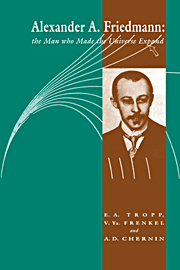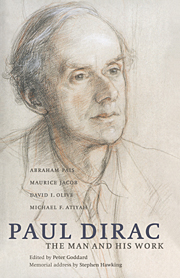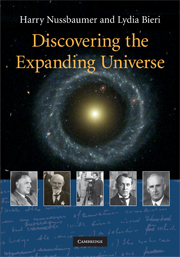Alexander A Friedmann
Our universe can be described mathematically by a simple model developed in 1922 at Petrograd (St Petersburg) by Alexander Friedmann (1888–1925), who predicted that the whole universe would expand and evolve with time before there was any observational evidence. He was an outstanding Soviet physicist, and this vivid 1993 biography is set in a wide historical background. The book is a window on the school and university years, military service, teaching and research during a seminal period of Soviet history. The authors include unique archival material, such as Friedmann's letters from the Front, as well as contemporary records and reminiscences of colleagues. There is a detailed treatment of his work in Theoretical Cosmology (1922–1924), set in the context of the organization of Soviet science at the time.
- The only account of the person who first suggested that our universe is expanding and evolving
- A fascinating glimpse of the organization of higher education and science in the period 1917–24
- Includes unpublished archival material and personal letters
Reviews & endorsements
"Friedmann's name has been appearing more frequently in the literature, but this book is the first detailed biography of him to become available in English and thus is of particular value." American Historical Review
"This book fills a large gap in the literature of the history of science...admirably opens the history pf Russian physics to closer scrutiny." Paul R. Josephson, Journal of Interdisciplinary History
"...the volume contains a wealth of archival material, identified in the text if not in footnotes, whose discpvery is discussed charmingly wit a freshness...coveying the excitement of historial research." Noriss S. Hetherington, Historical Studies in the Physical and Biological Sciences
"...full of interesting information." Harold Zirin, Nature
"...its wealth and its generous citation of Friedmann's popular works on space and time help to fill in a place, a time and a mind we ought to know. No other such source is found in English." Scientific American
"...the prose is sometimes intensely personal, reflecting Friedmann's close association with Yakov Ilyich Frenkel, the physicist father of coauthor Viktor Ya. Frenkel. We see how, under the early Bolsheviks, young physicists and mathematicians quickly arrrived at positions of authority and how they vigorously pursued research by their own hands once they had settled into commanding situations." Lewis Pyenson, Physics Today
"...this biography provides considerable archival material hitherto unavailable." E. Robert Paul, Isis
"...this biography is so well done that...it provides a valuable new perspective on the survival/transformation of Russian science between 1910 and 1925 and on the participation of applied mathematicians in the creation of modern cosmology between 1910 and 1940." Karl Hufbauer, Slavic Review
"...its wealth and its generous citation of Friedmann's popular works on space and time help to fill in a place, a time and a mind we ought to know. No other such source is found in English." Scientific American
Product details
May 2006Paperback
9780521025881
280 pages
235 × 156 × 16 mm
0.397kg
26 b/w illus.
Available
Table of Contents
- Preface
- 1. The Friedmanns and the Vojaceks
- 2. At the 2nd St Petersburg Gymnasium
- 3. University years, 1906–14
- 4. In search of a way
- 5. War years
- 6. Moscow - Perm - Petrograd
- 7. Theoretical department of the Main Geophysical Observatory
- 8. Space and time
- 9. Geometry and dynamics of the Universe
- 10. Petrograd, 1920–4
- 11. The final year
- 12. Friedmann's world
- Conclusion
- Main dates in Friedmann's life and work
- Bibliography
- Name Index.





